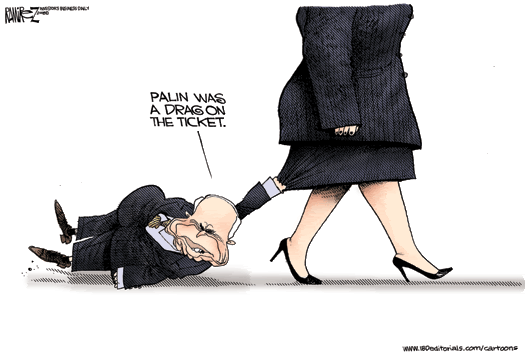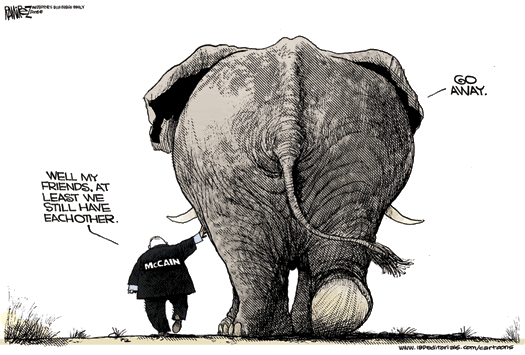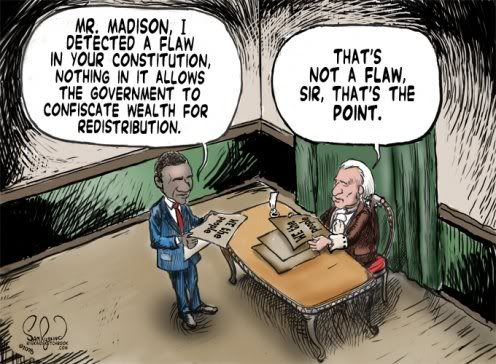Brokaw: There are conservative commentators who say there’s a lot about him we don’t know, because we haven’t asked enough tough questions; the Bill Ayers relationship, even those who say we’ve got to go back and explore what his drug use was, . . .
Rose: Even though Senator McCain had a chance to do that very thing, and ask him about it in one of the debates
Brokaw: And did not, chose not to go there.
—
Rose: What do we know about the heroes of Barack Obama?
Brokaw: Well, he uh, Thurgood Marshall is a big hero of his. He’s got a picture of him in his office.
Rose: Is that because of his central role in arguing Brown v. Board of Education?
Brokaw: Well, I think, remember Barack Obama went to Harvard Law School, taught at the University of Chicago. And there was no greater legal figure in the African-American community or even signs that America was changing than Thurgood Marshall, so that makes perfect sense. Um, you know it’s an interesting question. I don’t know what books he’s read. I know that he’s uh, he’s got a great curious mind. So does John McCain, by the way. He’s always got a book in his hand. Mark Salter who’s a first rate writer . .
Rose: Is his old best friend.
Brokaw: Right. They’re trading book ideas constantly.
—
Rose: Have we had a serious debate about foreign policy in this country?
Browkaw: No. We’ve not had. There are a number of issues that have not come up. John McCain believes in a league of democracy – putting together a separate group to push against Russia. Charles Krauthammer wrote that that was, he couldn’t say and I can as Charles put it, that was designed to kill the United Nations which is a good idea. We didn’t examine that very carefully. We don’t know a lot about Barack Obama and the universe of his thinking about foreign policy. China has been not examined at all.
Rose: At all.
Brokaw: Which is astonishing.
Rose: But do we know about what they think? It is more likely that we’ll know about John McCain because he’s been speaking about foreign policy over a longer period of time.
Brokaw: Right.
Rose: But I don’t really know, and do we know anything about the people who are advising them, I mean in terms of whether – Susan Rice and where they are. And do we know who might populate these governments.
Brokaw: Tony Lake who worked in the Clinton Administration. Dick Holbrook obviously is eager to be involved in the briefings. There are some kind of neutral foreign policy specialists in the academies and the Council of Foreign Relations that Barack Obama has been reaching out to. John McCain has been reaching out to those think-tanks and institutes
Rose: AEI and others.
Brokaw: Right of center. Sure. We do know, who, do we know is going to be secretary of state? No.
—
Rose: I think it was you, and maybe not and you’ll correct me, but after we began to understand the implications of terrorism and someone asked you whether there was subjects that you thought journalism hadn’t done its job, media hadn’t done its job, you suggested understanding what was brewing out there.
Brokaw: That was me, and I talked about all the incidents that were building up, the Cole, the attack on the embassies in Tanzania and Kenya, and we would report them but we didn’t connect the dots. And I went to see Louis Freeh about something else one time – we were talking about computer crimes – and he said “You should look into terrorism.” And I walked out thinking “We should look at terrorism,” and didn’t.
—
Rose: There are so many things I don’t know in terms of the makeup of. . . we’ve gone through this long campaign. I care about it almost as much as you do in terms of being a political junkie. But there are questions you don’t know in terms of. . . I don’t know know what Barack Obama’s world view is. I really don’t know.
Brokaw: No, no, I don’t either.
Rose: I don’t know how he really sees where China is and where it wants to go, and how smart he is about that, or India, or the whole global structure.
Brokaw: Well, one of the . . .
Rose: Or John McCain either.
Brokaw: Yeah, one of the things I tried to get out of the national debate, and they began to answer it a little bit, which I think is an important question: what is the Obama Doctrine and the McCain Doctrine when there is a humanitarian crisis? We’re going through one this week in the Congo. Again, I raised the Congo as an example of that. And the use of American military forces to intervene if we have no national security stake in all of that. And they both said in kind of the broadest possible terms, “Well we should go help out.” but you didn’t get the impression that they were going to go pull the trigger on that in the next day. That’s an important discussion for this country to have.
Rose: If you look at Rwanda, and where you’ve been, and the Secretary – former Secretary of the United Nations has said “We made mistakes.” The President of the United States has said “We’ve made mistakes.” Where would they be if they faced the same choices with respect to that kind of genocide?
Brokaw: And that’s what we should know.
Rose: And we don’t know.
Out of context? Somewhat. But I think this comment left at Charlie Rose’s site pretty much sums it up:
One more thought: All the commentary in the interview about Obama having to “move to the center to govern” is going to be pretty funny about this time next year, I think.



